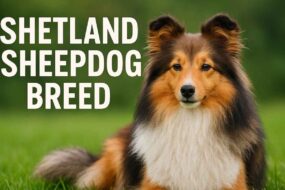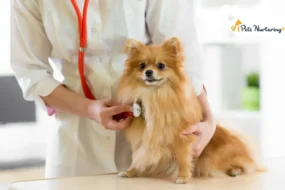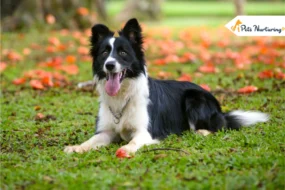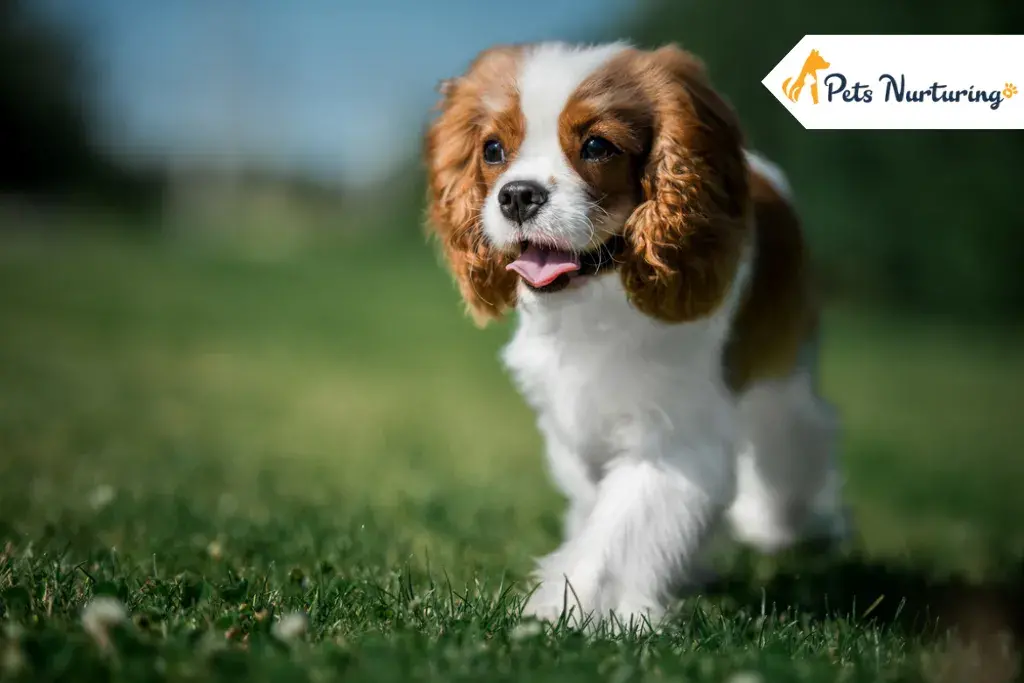
If you are looking for a toy dog that looks cute with soulful eyes, then look no further; the Cavalier King Charles Spaniel is the perfect choice for you.
Originating from England, this spaniel breed has a rich history dating back centuries. Their gentle, loving nature has won the hearts of countless individuals and families.
But, beyond being adorable, this breed offers temperament and characteristics that make them an ideal addition to various households.
Their intelligence, eagerness, and adaptable nature allow them to thrive in different environments. Whether you need a companion, a toy dog, or a guardian, Cavalier King Charles Spaniel is well-equipped to fulfill your needs.
So, if you are eyeing this British breed, then continue reading this blog. We’ll explore their history, appearance, personality, and care requirements, helping you decide if this charming breed could be the perfect furry friend for you.
So, settle in; here we go!
Cavalier King Charles Spaniel
Breed Group: Companion Dog
Height: 12 to 14 Inches
Weight: 13 to 18 Pounds
Lifespan: 12 to 15 Years
Coat: Long, silk, and soft
Color: Blenheim, Black and Tan, Ruby, and Tricolor
Vocal Level: When Necessary
Temperament: Loyal, Friendly, and Outgoing
Needs of Grooming : Moderate
Hypoallergenic: No
Origin : England
History
The history of the Cavalier King Charles Spaniel is steeped in royal connections and centuries-old domestication.
Originating from England, this breed’s lineage can be traced back to the early 17th century, during the reign of King Charles II.
It is said that the breed was named after King Charles II himself, who was deeply in love with these elegant dogs and often showcased them in his portraits.
These Spaniels are depicted in renowned paintings by Van Dyck and Gainsborough. These breeds were cherished companions of the king and often accompanied the monarch everywhere.
When King Charles II was the ruler, the Cavalier King Charles Spaniel became very popular, especially among wealthy people and aristocrats.
King Charles II loved these dogs a lot and treated them like they were part of his family. He let them go wherever they wanted in his palaces and even made rules to make sure they were taken care of and safe.
However, after the King Charles II dynasty fell, the breed’s fortunes changed. Crossbreeding with flat-faced breeds like pugs resulted in a shift in appearance, and the original “long-nosed” type became increasingly rare.
After the war, only a few dogs survived, and these few became the ancestors of all the Cavaliers we see today.
In 1945, the Kennel Club officially recognized the breed as the Cavalier King Charles Spaniel. The first Cavalier, King Charles Spaniel, was brought to the United States from the UK in 1956 by a person named W. Lyon Brown.
Together with Elizabeth Spalding and other people who loved these dogs, started a club for Cavalier King Charles Spaniels in the US, which still exists today.
Finally, in 1995, the American Kennel Club recognized the Cavalier King Charles Spaniel, and the club became the leading club for Cavaliers.
Since the year 2000, these dogs have become more and more popular in the US and now rank as the 15th most popular purebred dog in the country.
Cavalier King Charles Spaniels has appeared in numerous films and TV shows, including “Sex and the City” and “The Princess Diaries.
Appearance
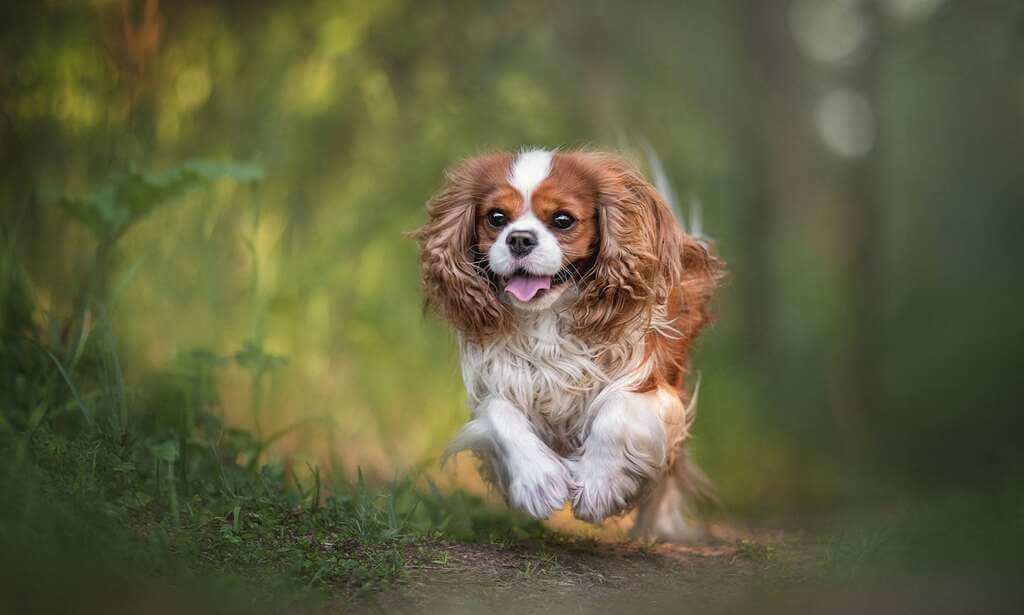
The Cavalier King Charles Spaniel is a small to medium-sized dog breed known for its cute, elegant, and charming appearance.
About their height and weight:
| Cavalier King Charles Spaniels | Height | weight |
| Male | 12-13 Inches | 13-18 pounds |
| Female | 9-12 inches | 11- 16 pounds |
Build:
They have a well-balanced and compact build with a sturdy and graceful appearance. Their bodies are slightly longer than their heights.
Head:
Cavaliers have distinctive heads with slightly rounded skulls. Their muzzle is moderately long and tapers slightly towards the nose.
Eyes:
One of the most adorable features of Cavaliers is their large, round, and expressive eyes. Their eyes are dark and set widely apart, giving them a soulful and affectionate expression.
Ears:
They have long, feathered ears that hang down close to their cheeks. Their ears are set high on the head and frame the face beautifully.
Markings:
Cavaliers have markings on their bodies, which enhances their appearance. These marks not only make them look adorable but also show off their lively and royal personality.
Coat and color
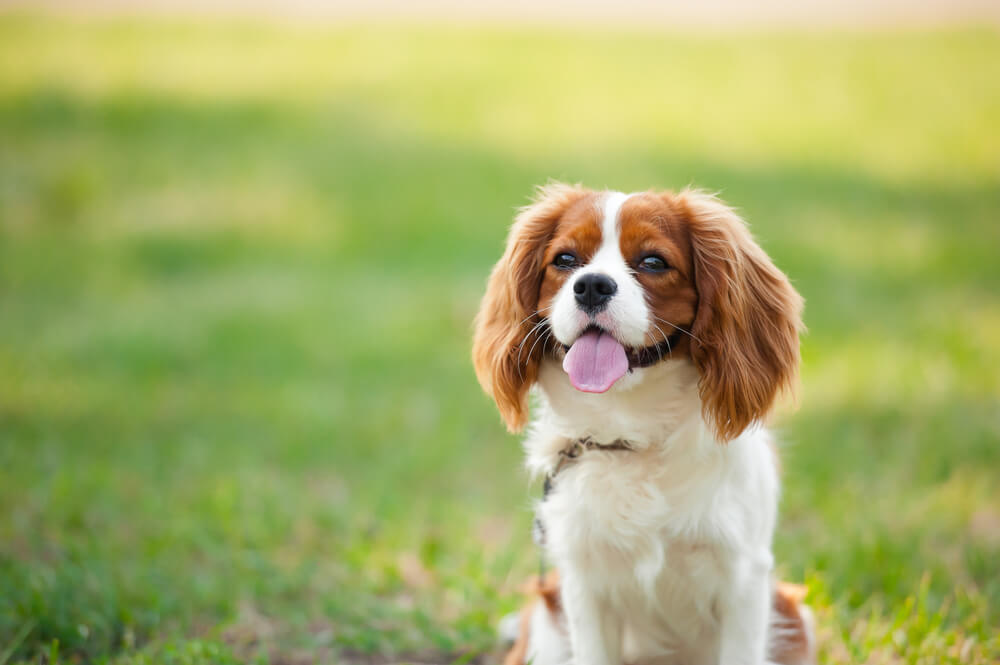
The coat of the Cavalier King Charles Spaniel is one of its most distinctive features. It is silky, smooth, and of medium length, with a slight wave. The texture of their coat is soft to the touch and lies flat against their body, which creates a luxurious appearance.
In addition to their silky coat, Cavaliers also have feathers on certain parts of their body, including their ears, chest, legs, and tail. This feathering adds to their overall elegance and beauty.
About their color, Cavalier King Charles Spaniel comes in varied colors that include:
- Blenheim
- Tricolor (black, white, and tan)
- Ruby
- Black and Tan
- Brown
Each of these colors adds to the majestic appearance of this breed, which makes the Cavalier King Charles Spaniel look elegant and enchanting.
Characteristics and Temperament
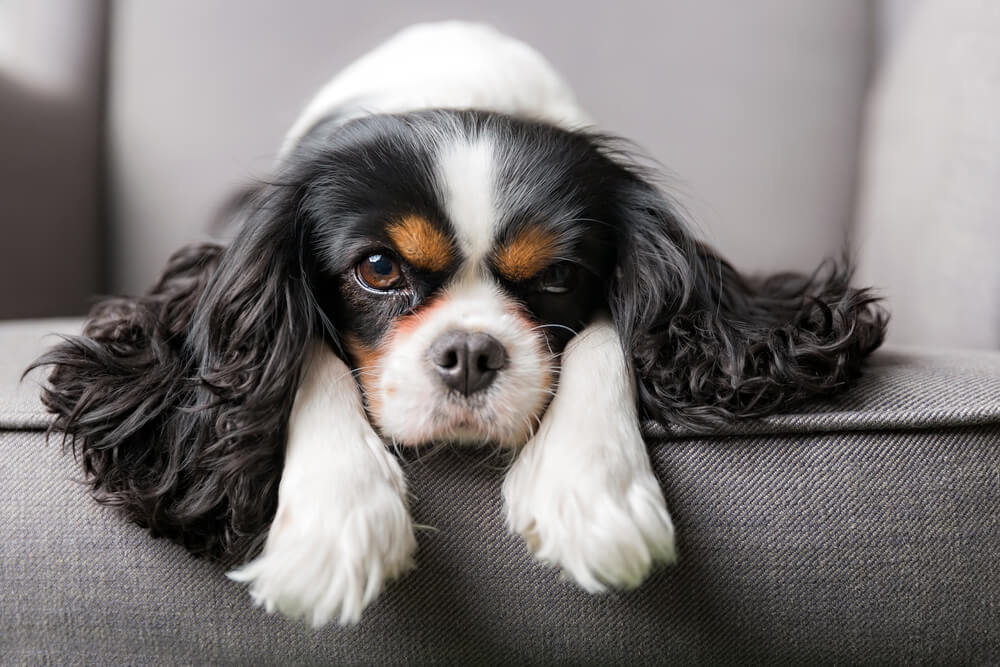
Cavaliers often carry friendly disposition. They can be your great companion or toy dog for your children. They are care-loving by nature and love to play with family members. Explore more about them:
Affectionate:
Cavaliers are incredibly loving and enjoy being close to their human companions. They often seek out cuddles and affection, which makes them wonderful lap dogs.
Friendly:
These dogs are naturally friendly and get along well with people of all ages, as well as with other pets. Their friendly behavior makes them great family pets and excellent companions for children.
Gentle:
Cavaliers have a gentle disposition and are known for their kind and patient nature. They are not prone to aggression and are typically tolerant of handling, making them suitable pets for families with young children.
Playful:
Despite their aristocratic appearance, Cavaliers have a playful side and enjoy engaging in activities such as chasing toys, playing fetch, or romping around in the backyard.
Intelligent:
They are quick learners and respond well to positive reinforcement training methods. Cavaliers are eager to please their owners and enjoy participating in obedience training, agility, and other canine sports.
Adaptable:
Whether living in a spacious home with a large yard or a cozy apartment in the city, Cavaliers can be low-energy dogs. Still, they adapt well to various living environments. They are equally content lounging indoors or exploring the great outdoors.
Companionable:
Cavaliers crave human companionship and thrive on being part of the family. They are happiest when they are by their owner’s side, whether it’s going for a walk, lounging on the couch, or simply enjoying each other’s company.
Health and Nutrition
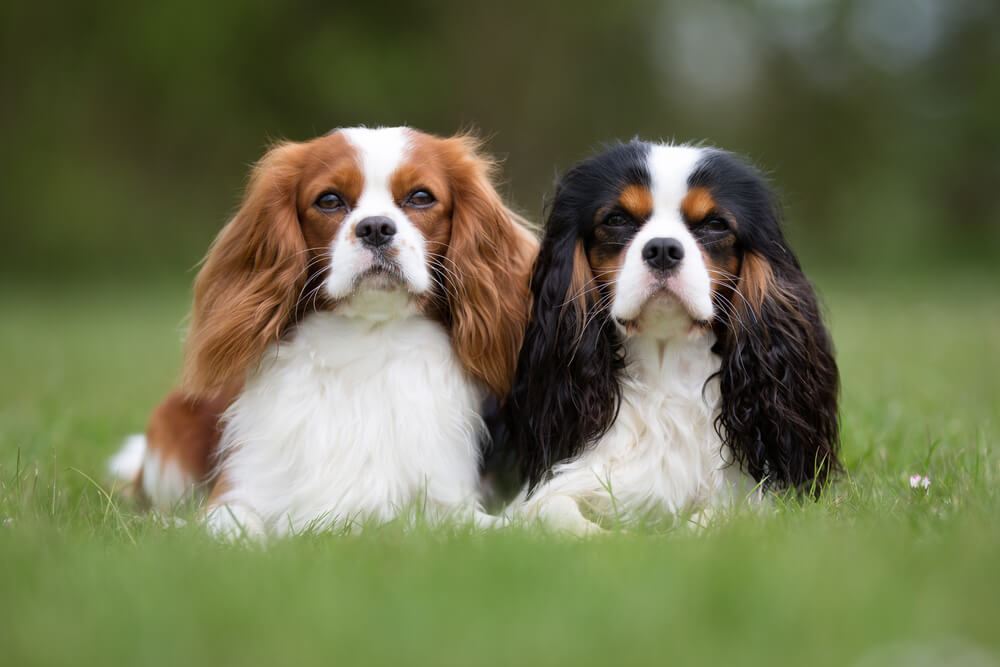
The Cavalier King Charles Spaniel’s gentle nature and playful spirit deserve to be nurtured with proper care. To ensure your furry friend thrives, understanding their specific health and nutritional needs is crucial.
Here is the table that you can refer to for your Cavalier King Charles Spaniel:
| Dog Type | Number of Cups | Number of Times |
| Cavalier King Charles Spaniel Puppies | ½ to 1 Cups of Food | 2 -4 times a day |
| Cavalier King Charles Spaniel Adults | 1 to 2 Cups of Food | 2 times a day |
| Cavalier King Charles Spaniel Seniors | ¼ to ½ cups of Food | 2 times a day |
Remember, this table offers an estimated diet plan for a Cavalier King Charles Spaniel. It is advisable to contact your vet for a perfect diet plan for your pet. The amount of food your dog requires depends upon their age, weight, and height.
Further, for their health and well-being, owners need to schedule regular checkups with a veterinarian. Regular checkups maintain the overall health of Cavaliers and help you diagnose any disease promptly.
Moreover, it is crucial to provide a balanced diet. Choose high-quality dog food that is appropriate for their age, size, and activity level. Avoid feeding them table scraps, as some human foods can be harmful to dogs.
Be mindful of portion sizes to prevent obesity, which can lead to various health issues. Follow feeding guidelines provided by the dog food manufacturer and adjust portions based on your Cavalier’s individual needs. Importantly, always ensure your Cavalier has access to fresh, clean water throughout the day to stay hydrated.
Common issues that Cavalier King Charles Spaniel faces are:
- Like many small breeds, King Charles cavalier puppies are prone to dental issues such as gum disease, tooth decay, and tartar buildup. Regular dental care is crucial for maintaining oral health.
- King Charles cavaliers have floppy ears; these long ears trap moisture and debris, which makes them prone to ear infections.
- Cavaliers may develop eye conditions such as cataracts, progressive retinal atrophy (PRA), and dry eye syndrome (keratoconjunctivitis sicca). Regular eye exams can help detect and manage these issues early.
- Mitral Valve Disease (MVD) is the most common heart condition affecting Cavaliers. It involves the degeneration of the mitral valve, leading to heart murmurs, congestive heart failure, and other cardiac issues.
- Cavaliers can be susceptible to hip dysplasia, a genetic condition where the hip joint doesn’t develop properly, leading to joint instability, pain, and arthritis.
Not all Cavaliers are susceptible to these conditions, but a proper diet, regular checkups, and sound environments keep your dog healthy and provide a long life.
Behavior and Training
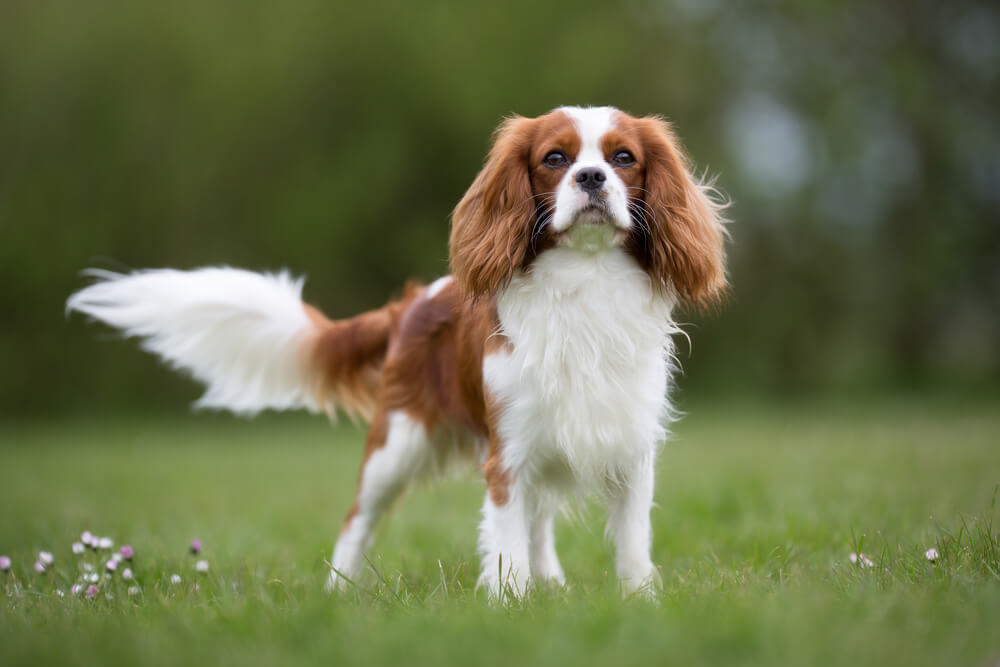
Cavalier King Charles Spaniels are known for their friendly, affectionate, and pleasant nature. They are typically good-natured dogs that enjoy being around people and other pets. Cavaliers are often described as gentle and eager to please, which makes them excellent family pets and therapy dogs.
Further, these adaptable dogs can adjust to various living situations, making them suitable for apartments, houses, and families with children. Their gentle nature makes them sensitive to corrections and loud noises.
Positive reinforcement training methods work best for these intelligent dogs. While not overly demanding, Cavaliers enjoy playtime and walks that need moderate exercise to stay happy and healthy.
About their training: Cavaliers are intelligent and trainable dogs that respond well to positive reinforcement techniques such as praise, treats, and play. They are eager to please their owners and enjoy learning new tricks and commands.
Consistent training from an early age is essential to establish good behavior and prevent any potential issues. Basic obedience training, including commands such as sit, stay, come, and leash walking, is essential for Cavaliers.
Additionally, socialization with other dogs and exposure to various environments and experiences help ensure that Cavaliers grow up to be well-adjusted and confident companions. However, keeping patience, consistency, and positive reinforcement are fundamental to successful training with the Cavaliers.
Grooming Needs
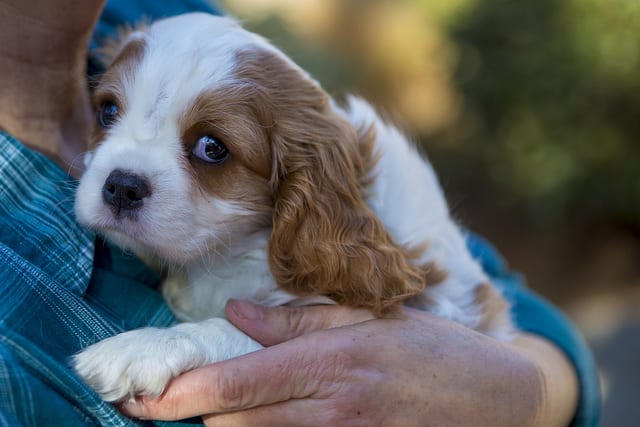
Cavalier King Charles Spaniels have moderate grooming needs to keep their beautiful coats healthy and tidy. Here’s what you need to know:
| Brooming Needs | Number of times |
| Brushing | Two to three times a week |
| Bathing | Needs Occasional Baths |
| Ears Cleaning | Regularly once or twice a week |
| Teeth Cleaning | At least thrice a week |
| Nails Cleaning | Trim your Cavalier’s nails every 2-4 weeks to keep them at a comfortable length |
| Skin and Coat Inspection | Regularly twice a month |
| Eye Care | Wipe and clean eyes everyday |
| Wrinkles | Gently wipes wrinkles on their face regularly |
By incorporating regular grooming into your Cavalier King Charles Spaniel’s care routine, you can help keep them looking and feeling their best while also monitoring their overall health. Additionally, grooming provides an opportunity to bond with your pet and reinforce the trust between you.
Cavaliers have been featured in various works of literature, including Sir Arthur Conan Doyle’s Sherlock Holmes stories and novels by English author Virginia Woolf.
Are Cavalier King Charles Spaniel Hypoallergenic?
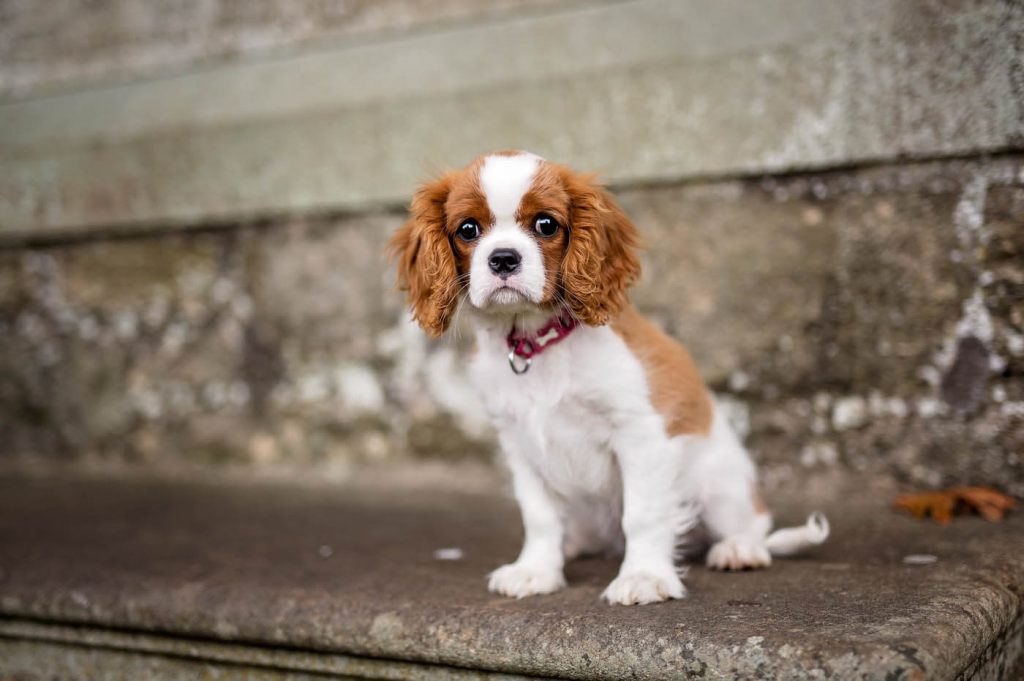
No, Cavalier King Charles Spaniels are not considered hypoallergenic. While no dog breed is entirely hypoallergenic, some breeds are less likely to trigger allergies in people who are sensitive to pet dander. However, Cavaliers are not one of those breeds. They have a moderate shedding coat that produces dander, saliva, and urine proteins, which can potentially cause allergic reactions in susceptible individuals. If you or someone in your household has allergies but still wishes to have a dog, it’s essential to spend time around Cavaliers to assess whether their presence triggers allergic symptoms.
Price
The price of a Cavalier King Charles Spaniel can vary widely depending on factors such as the dog’s pedigree, lineage, age, health, location, and breeder reputation. On average, you can expect to pay anywhere from $1,500 to $3,500 for a Cavalier King Charles Spaniel puppy from a reputable breeder.
However, if you want to purchase a Cavalier at a low rate, search on Google for “Cavalier King Charles Spaniel puppies for sale near me.”
This will help you find a Cavalier King Charles Spaniel for sale at affordable prices. The cost of King Charles Spaniel for sale may cost you around $800 to $1200.
Life span
The average lifespan of a Cavalier King Charles Spaniel is typically between 9 to 14 years. However, with proper care, regular veterinary check-ups, a balanced diet, regular exercise, and a healthy lifestyle, some Cavaliers may live even longer. It’s important to note that individual factors such as genetics, overall health, diet, exercise, and environmental factors can influence a Cavalier’s lifespan.
Bring Home the Joyful Cavaliers Today
Here, we conclude the information on the Cavalier King Charles Spaniel. We hope this information has been helpful in your decision-making process. Nonetheless, if you are bringing Cavaliers home, make sure you check all its health certifications, health vaccinations, and health reports. This ensures your pet’s well-being and sets the foundation for a long, happy, and fulfilling companionship together.
FAQs
Cavalier King Charles Spaniels can be moderately expensive, with prices typically ranging from $1,500 to $3,500 for a puppy from a reputable breeder.
The worthiness depends on your lifestyle, preferences, and commitment to caring for a dog. They are known for their friendly nature and make excellent companions, but they require regular care and attention. Consider factors such as temperament, compatibility with your lifestyle, and commitment to long-term care before deciding if a Cavalier is the right choice for you.
Cavalier King Charles Spaniels are not considered high-maintenance compared to some other breeds, but they do have specific care needs. Cavaliers require moderate maintenance in terms of grooming, exercise, and health care, but their loving nature and companionship make them well worth the effort.
Explore Further








